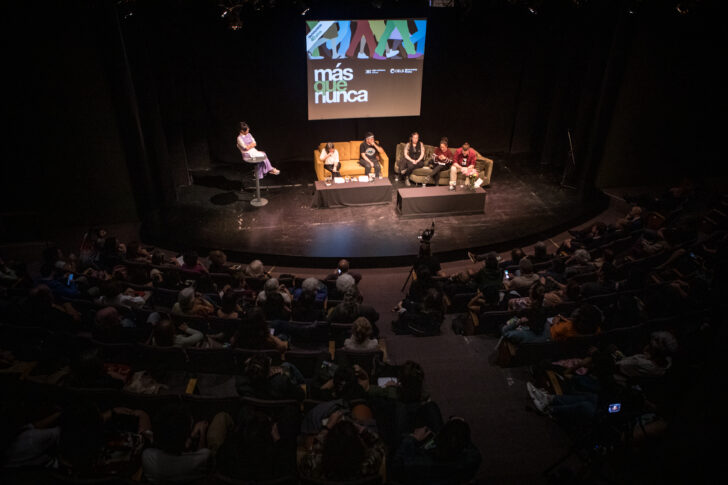On Wednesday, April 26, we presented Más que Nunca. 12 debates necesarios para construir la democracia del futuro [More than Ever. 12 Necessary Debates to Shape the Democracy of the Future], a book edited by CELS and published in partnership with Siglo XXI. The presentation took place at the Teatro Picadero in Buenos Aires.
The event consisted of a collective interview led by journalist Flor Alcaraz, with the participation of Lef Nawel (lawyer and member of Lof Newen Mapu), Juan Ruocco (writer and researcher), Dina Sánchez (Deputy General Secretary of UTEP and representative of FPDS), Ángela Urondo Raboy (visual artist, writer, and educator), and Paula Litvachky, Executive Director of CELS.
“We are contemplating how to position ourselves in a complex juncture, within a democracy that has shown clear limitations in responding to the needs of the majority and the protection of rights,” said Paula Litvachky at the beginning, as an invitation to engage in the debates proposed in the book and connect them to the current political and social context.
The proliferation of right-wing ideologies, the need to draw from past struggles to envision the future, the relationship between the State and human rights, social, and indigenous movements were some of the key topics discussed during the event at the Picadero.
“We must rescue the value of organization as a tool to act in the face of the ethics and discourse of cruelty perpetuated by the right-wing,” Ruocco shared, highlighting the value of sectors that still resist this narrative. On the other hand, Dina Sánchez remarked, “This book is important for fostering profound and collective debate because it’s very challenging to defend democracy when 40% of our children are living in poverty and the IMF is running our economy.”
Lef Nawel brought the Mapuche conflict and the issues of indigenous communities into the discussion. “The native nations need to have a relationship not only with the State but also with the Argentine people, who are our allies in breaking social inequality. Those who attack us are the same ones who are getting rich at the expense of everyone else,” he said.
Angela Urondo Raboy proposed an exercise of collective memory to contribute to the present and the future. “The solidarity resources that were woven to live through the dictatorship are important to keep within reach, remember, and bring back. There’s something from our experience that we need to capitalize on,” she affirmed.
Before wrapping up, an invitation was extended from the presenters on stage to the audience to collectively consider what needs to be done—now more than ever—to build democracy and equality “We need to think about human rights movements and their future, reclaiming our identity and political practices. It’s a task that requires creativity and a steadfast belief that it’s possible,” Paula Litvachky added.
We thank all those who joined us and participated. More meetings and debates will be held throughout 2023.

